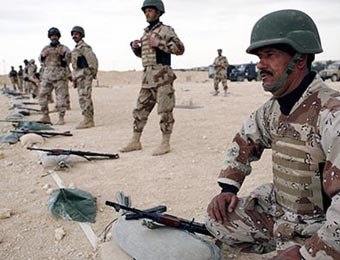Over 1,000 Iraqi soldiers, policemen refuse to fight Basra's Shia militias
 New York, Apr 4: Over 1,000 Iraqi soldiers and policemen have either refused to fight or simply abandoned their posts during the inconclusive assault against Shia militias in Basra last week, a senior Iraqi government official has said.
New York, Apr 4: Over 1,000 Iraqi soldiers and policemen have either refused to fight or simply abandoned their posts during the inconclusive assault against Shia militias in Basra last week, a senior Iraqi government official has said.
The New York Times quoted Iraqi military officials as saying that the group of deserters included dozens of officers, including at least two senior field commanders in the battle.
Colonel Rahim Jabbar and Lt. Colonel Shakir Khalaf, the commander and deputy commander of an entire brigade affiliated with the Interior Ministry, are among those who had been relieved of duty for refusing to fight.
A senior military official in Basra asserted that some members of Colonel Khalaf's unit fought, even though he did not.
Asked why he believed Lt. Colonel Khalaf did not fight, the official said that the colonel did not believe the Iraqi security forces would be able to protect him against threats to his life that he had received for his involvement in the assault.
"If he fights today, he might be killed later," the official said.
The desertions in the heat of a major battle cast fresh doubt on the effectiveness of the US-trained Iraqi security forces.
The crisis created by the desertions and other problems with the Basra operation was serious enough that Prime Minister Nuri Kamal al-Maliki hastily began funnelling some 10,000 recruits from local Shiite tribes into his armed forces.
The paper said that the move has already generated anger among Sunni tribesmen whom Maliki has been much less eager to recruit despite their cooperation with the government in its fight against Sunni insurgents and criminal gangs.
Maliki, who personally directed the Basra operation, which both American and Iraqi officials have criticised as poorly planned and executed, acknowledged the desertions without giving a specific number in public statements.
A British military official said that Maliki had brought 6,600 reinforcements to Basra to join the 30,000 security personnel already stationed there.
A new National Intelligence Estimate on Iraq cites significant security improvements but concludes that security remains fragile, the NYT reported.
Even as officials described problems with the planning and performance of the Iraqi forces during the Basra operation, signs emerged that tensions with Moqtada al-Sadr, the radical cleric who leads the Mahdi Army militia, could flare up again.
Sadr, who asked his followers to stop fighting on Sunday, called on Thursday for a million Iraqis to march to the Shiite holy city of Najaf next week to protest what he called the American occupation.
He also issued a veiled threat against Maliki's forces, whom he accused of violating the terms of an agreement with the Iraqi Government to stand down. (ANI)